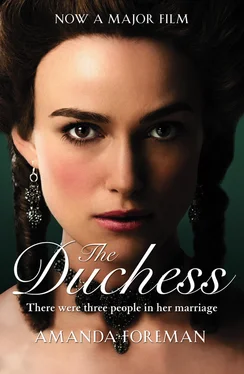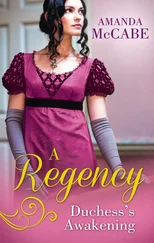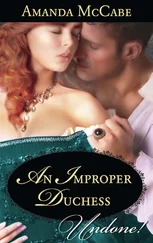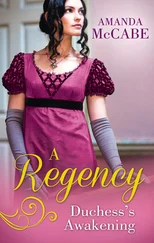Morning Herald and Daily Advertiser , 21 October 1782
As SOON AS parliament adjourned for the summer Georgiana and the Duke retreated to Bath. They did not return to Devonshire House until the autumn, when the new session was well under way. Accompanying them to London was Lady Elizabeth Foster, described by the papers as the ‘Duchess of Devonshire’s intimate friend’.
Georgiana met Elizabeth, or Bess, as she affectionately called her, during their first week at Bath. The Duke had rented the Duke of Marlborough’s house, one of the finest in town, for the whole summer. The Devonshires were both there to ‘take the cure’: the Duke for his gout, Georgiana for her ‘infertility’ – she had suffered two early miscarriages the previous year. 1 The tone of her letters betrays her misery at having to abandon London just when the Whigs had come to power. She rarely went out and attended few of the balls and nightly concerts in the Assembly Rooms. Twice a day she drank the thermal waters in the King’s Bath, the most fashionable of the three pump rooms. The company there was hardly uplifting, comprising the unfortunate casualties of eighteenth-century living: the incurables, the rheumatics, the gout sufferers, and those afflicted with rampant eczema and other unsightly skin diseases. Georgiana sat each morning in a semicircle near the bar with the other childless wives, cup and saucer in either hand, listening to a band of provincial musicians. Bath was, in her opinion, ‘amazingly disagreeable, I am only surprised at the Duke bearing it all as well as he does, but he is so good natur’d he bears anything well’. 2
Two things made life tolerable: watching the new Shakespearean actress Sarah Siddons at the Theatre Royal, and the acquaintance of two sisters living in straitened circumstances in an unfashionable part of town. On 1 June Georgiana informed Lady Spencer, ‘Lady Erne and Lady E. Foster are our chief support or else it would be shockingly dull for the D. indeed.’ 3 These were the eldest daughters of the Earl of Bristol; Lady Mary Erne was a great friend of Mary Graham, who was probably responsible for the sisters’ introduction to Georgiana. Both were separated from their husbands, and lived with their aunt, a Methodist convert, on the tiny income allocated to them by their father.
Georgiana’s letters to her mother were full of praise for her new friends: ‘You cannot conceive how agreeable and amiable they are, and I never knew people who have more wit and good nature.’ 4 But after a short time there was no more mention of Lady Mary Erne, and Lady Elizabeth Foster – Bess – became the sole topic of her correspondence. She was the same age as Georgiana and already the mother of two sons, yet there was something surprisingly girlish about her. Physically, she was the opposite of Georgiana: slimmer, shorter, more delicate, with thin dark hair framing her tiny face. Her appearance of frailty, coupled with a feminine helplessness and coquettish charm, made most men want to protect and possess her. The historian Edward Gibbon, who had known Bess since she was a little girl, described her manners as the most seductive of any woman he knew. ‘No man could withstand her,’ was his opinion. ‘If she chose to beckon the Lord Chancellor from his Woolsack in full sight of the world, he could not resist obedience.’ 5
Bess’s family, the Herveys, were not the sort that recommended themselves to Lady Spencer. Lady Mary Wortley Montagu is alleged to have said: ‘When God created the human race, he created men, women, and Herveys.’ * The quip could apply to each generation: eccentric, libertine and untrustworthy, the Herveys were an extraordinary family who had made their fortune in the early eighteenth century as professional courtiers. Bess’s father, the fourth Earl of Bristol, had succeeded unexpectedly to the title on the death of his two elder brothers without legitimate heirs. † He took the well-worn path to a career in the Church, eventually becoming the Bishop of Derry, which brought him a modest salary. But the Earl-Bishop’s spendthrift habits meant that Bess, her brother and two sisters were brought up in relative poverty. He had two great passions: one was for art, and the other a morbid fascination with human misery. He was constantly rushing to the scene of wars, riots and natural disasters. The family spent years roaming the Continent from one terrible situation to another while he searched for antiquities and objets d’art along the way.
On succeeding to the title in 1779 Bess’s father inherited Ickworth Park in Suffolk, and with it an income of £20,000 a year. 6 Immediately he embarked on a grandiose building scheme to house his planned art collection. But the Earl-Bishop’s good fortune had come too late for his daughters, especially for Bess. She had married in 1776 while still Miss Elizabeth Hervey, a mere bishop’s daughter with no dowry and few acquaintances. Her husband, John Thomas Foster, was a family friend and a member of the Irish parliament. At the time general opinion congratulated Bess on her advantageous match. Foster was careful with money, serious (if a little humourless), and uninterested in city life. Later Bess claimed she had married him under duress: ‘I really did on my knees ask not to marry Mr F. and said his character terrified me, and they both have since said it was their doing my being married to him,’ she told Georgiana. 7 However, her parents’ letters suggest a different story – a love match between a respectable squire and a young bride impatient for her own establishment. ‘I like the young man better than ever,’ the Earl-Bishop told his daughter Mary, ‘and think him peculiarly suited to her.’ 8
Whatever the truth, by 1780 the marriage was in jeopardy. Bess’s father, who was busy supervising his building works, ordered his wife to bring the couple to heel. Bess was pregnant with her second child and the two were at Ickworth, bickering constantly. Lady Bristol obeyed reluctantly, complaining to Lady Mary, ‘With regard to the reconciliation, I do not think there is a ray of comfort or hope in it. It was totally against my opinion as to happiness , but your Father’s orders and her situation call’d for it … dejection and despair are wrote on her countenance, and tho’ I have no doubt that time might wear out her attachment , I believe nothing can remove her disgust … I have no hope of getting rid of him …’ She was also furious with her husband, whose sole motive in seeking a reconciliation was to avoid paying for his daughter’s upkeep: ‘For his part I am convinced that he is perfectly well pleased – affection, vanity and avarice being all gratified.’ 9 Lady Bristol does not name the object of Bess’s ‘attachment’ but he was clearly not Mr Foster, for whom Bess felt ‘disgust’.
In public the Herveys blamed the breakdown of the marriage on Mr Foster, who had seduced Bess’s maid. This was obviously a factor in Bess’s dislike. Nevertheless, she was willing to attempt a reconciliation, if only for the sake of her own two children, and was shocked when Foster demanded a complete separation. He ordered her to surrender their child and the infant as soon as it was weaned, refusing to pay a penny towards her support. The first act was legal in the eighteenth century as the father always had custody of his children, but the second was not under normal circumstances. Unless legally separated or divorced, a husband was liable for his wife’s debts and most families ensured that marriage contracts contained provisions for their daughters if there was a separation. Either Bess’s family had failed to do so, or Mr Foster had evidence of his wife’s adultery and threatened to divorce her if provoked.
In November 1781 Mrs Dillon, a distant relation of the Herveys, visited Ickworth and was appalled by Lord Bristol’s callousness: ‘Lady Elizabeth Foster has the most pleasing manner in the world. She is just at this moment in the most terrible situation. Her odious husband will settle so little on her that she must be dependent on her father, which is always an unpleasant thing. Her children, who are now here, are to be taken from her. All this makes her miserable … [Lord Bristol] has not taken his seat, nor will he let Lady Bristol go to Court or to town.’ 10 The Earl was shortly to abandon his family in England and resume his jaunts across Europe. In 1782 he rented out their London house and locked his wife out of her rooms at Ickworth.
Читать дальше












